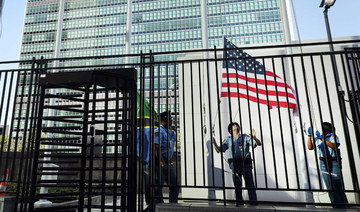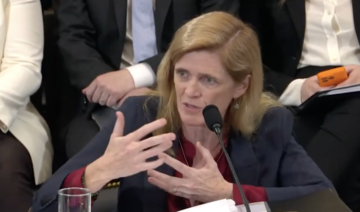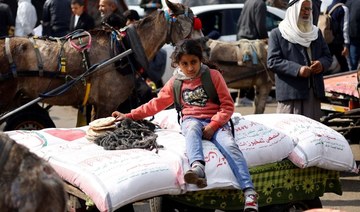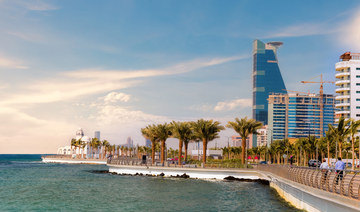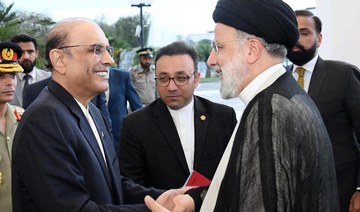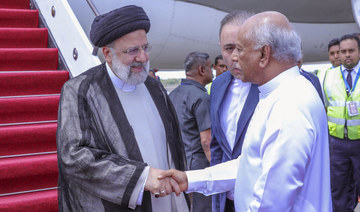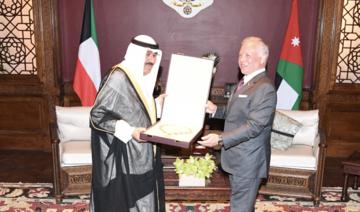BEIRUT: The conflict between Iran and the US that has created tensions throughout much of the Middle East is now also being felt in Lebanon, where Washington has slapped sanctions on the Iran-backed Hezbollah and warned they could soon expand to its allies, further deepening the tiny Arab country’s economic crisis.
The Trump administration has intensified sanctions on the Lebanese militant group and institutions linked to it to unprecedented levels, targeting lawmakers for the first time as well as a local bank that Washington claims has ties to the group.
Two US officials visited Beirut in September and warned the sanctions will increase to deprive Hezbollah of its sources of income. The push is further adding to Lebanon’s severe financial and economic crisis, with Lebanese officials warning the country’s economy and banking sector can’t take the pressure.
“We have taken more actions recently against Hezbollah than in the history of our counterterrorism program,” Sigal P. Mandelker, undersecretary for terrorism and financial intelligence at the US Treasury, said in the United Arab Emirates last month.
Mandelker said Washington is confident the Lebanese government and the central bank will “do the right thing here in making sure that Hezbollah can no longer have access to funds at the bank.”
Hezbollah, whose Arabic name translates into “Party of God,” was established by Iran’s Revolutionary Guard after Israel’s invasion of Lebanon in 1982. The group, which enjoys wide support among Lebanon’s Shiite community, runs institutions such as hospitals, clinics and schools — but it also has tens of thousands of missiles that Hezbollah’s leadership boasts can hit anywhere in Israel.
The group is designated as a terrorist organization by the United States, some Gulf Arab countries and few Latin American nations, while the European Union considers only Hezbollah’s military wing of the group to be a terrorist group.
Today, it is among the most effective armed groups in the Middle East with an arsenal more powerful than that of the Lebanese army, and has sent thousands of its fighters to Syria to back President Bashar Assad’s forces in that country’s civil war. Hezbollah and its allies have more power than ever in parliament and government and President Michel Aoun is a strong ally of the group.
Hezbollah has acknowledged the sanctions are affecting them, but it says it has been able to cope with sanctions imposed by the US for years. The group, however, warned that it is the job of the Lebanese state to defend its citizens when they come under sanctions simply because they belong to the group, are Shiite Muslims, or are Hezbollah sympathizers.
In July, the Treasury Department targeted two Hezbollah legislators, Amin Sherri and Mohammad Raad, in the first such move against lawmakers currently seated in Lebanon’s parliament. A month later, the Treasury’s Office of Foreign Assets Control sanctioned Jammal Trust Bank for what it called “knowingly facilitating banking activities.” The bank, which denied the charges, was forced to close afterward.
Neither Sherri nor Raad responded to requests for comment from The Associated Press.
So far, all the figures who have come under sanctions have been either Hezbollah officials or Shiite Muslim individuals who Washington says are aiding the group.
Hezbollah leader Hassan Nasrallah said the group will “study well our alternatives” now that the US is targeting banks that Hezbollah does not own or deal with, as well as rich individuals and merchants simply because of their religious affiliation.
“We said it in the past that when we are subjected to injustice we can be patient, but when our people are subjected to injustice we should behave in a different way,” he said.
Nasrallah said the state and the government should defend Lebanese citizens. In an apparent reference to the Lebanese central bank that implements US sanctions, Nasrallah said: “Some state institutions should not rush to implement the American desires and orders this way.”
Walid Marrouch, an associate professor of economics at the Lebanese American University, says Lebanon’s economy is 70% dollarized and since Lebanon is using this currency, Beirut has to abide by (US) laws.
“We’re already living in a crisis and it will only make it worse,” he said of sanctions and if Lebanon decides to stop abiding by US Treasury Department orders.
Antoine Farah, who heads the business section of the daily Al-Joumhouria newspaper, wrote that if Hezbollah’s desires turn out to be orders, “we will be facing a confrontation such that no one would want to be in our shoes.”
“If Hezbollah decides to fight America with the money of the Lebanese we guarantee a quick collapse and staying at the bottom for a long time, like Venezuela,” he wrote.
During a visit to Beirut, David Schenker, the US’s assistant secretary of state for near eastern affairs, said Washington will designate in the future “individuals in Lebanon who are aiding and assisting Hezbollah, regardless of their sect or religion.”
Schenker did not elaborate in his interview with local LBC TV but local TV stations said Washington could start targeting Christian allies of the militant group, which has 14 members in parliament and three Cabinet ministers, including the Health Ministry.
Health Minister Jamil Jabbak, who is not a member of Hezbollah but is believed to be close to the group’s leader, was not granted a US visa to attend the UN General Assembly in late September.
Treasury Assistant Secretary for Terrorist Financing Marshall Billingslea visited Lebanon last week and a US Embassy statement said he would “encourage Lebanon to take the necessary steps to maintain distance from Hezbollah and other malign actors attempting to destabilize Lebanon and its institutions.”
At the end of his visit, Billingslea met a group of journalists representing local media and told them that the US Treasury was posting a $10 million reward for anyone who provides “valuable information on Hezbollah’s finances,” according to the Daily Star.
He said the main goal of the US Treasury “was to deprive Hezbollah of all financial support, whether from Iran or through any other means.” Billingslea said Iran used to send the group $700 million a year, adding that US sanctions on Iran have “diminished considerably” the cash inflow.
Imad Marmal, a journalist close to Hezbollah who has a talk show on the group’s Al-Manar TV, wrote that the group wants the Lebanese state to put forward a national plan to face the “American siege” that will end up affecting not only Shiites but the country’s economy generally. He added that those who are being targeted by the sanctions are Lebanese citizens, whom the state should protect.
Hezbollah “is not going to scream in pain as the United States is betting, neither today nor tomorrow and not even in a hundred years.”
US sanctions squeezing Iran-backed Hezbollah in Lebanon
US sanctions squeezing Iran-backed Hezbollah in Lebanon

- The group is designated as a terrorist organization by the United States, some Gulf Arab countries and few Latin American nations, while the European Union considers only Hezbollah’s military wing of the group to be a terrorist group
- The Trump administration has intensified sanctions on the Lebanese militant group and institutions linked to it to unprecedented levels
A blast near a ship off Yemen may mark a new attack by Houthi rebels after a recent lull
- Houthis have launched more than 50 attacks on shipping, seized one vessel and sank another since November
- The explosion happened some 130 kilometers southeast of Djibouti in the Gulf of Aden
The explosion, reported by the British military’s United Kingdom Maritime Trade Operations center, comes after a relative lull from the Houthis after they launched dozens of attacks on shipping in the region over Israel’s ongoing war on Hamas in the Gaza Strip.
The Houthis did not immediately claim responsibility for the blast, but suspicion fell on the group as they’ve repeatedly targeted ships in the same area. It typically takes the Houthis several hours before acknowledging their assaults.
The explosion happened some 130 kilometers southeast of Djibouti in the Gulf of Aden.
“The master of a merchant vessel reports an explosion in the water a distance form the vessel,” the UKMTO said. “Veseel and crew reported safe. Authorities are investigating.”
The private maritime security firm Ambrey separately reported the apparent attack.
The Houthis have launched more than 50 attacks on shipping, seized one vessel and sank another since November, according to the US Maritime Administration.
Houthi attacks have dropped in recent weeks as the rebels have been targeted by a US-led airstrike campaign in Yemen and shipping through the Red Sea and Gulf of Aden has declined because of the threat. American officials have speculated that the rebels may be running out of weapons as a result of the US-led campaign against them and firing off drones and missiles steadily in the last months.
The Houthis have said they would continue their attacks until Israel ends its war in Gaza, which has killed more than 34,000 Palestinians there. The war began after Hamas-led militants attacked Israel on Oct. 7, killing 1,200 people and taking some 250 others hostage.
The ships targeted by the Houthis largely have had little or no direct connection to Israel, the US or other nations involved in the war. The rebels have also fired missiles toward Israel, though they have largely fallen short or been intercepted.
The assaults on shipping have raised the profile of the Houthis, who are members of Islam’s minority Shiite Zaydi sect, which ruled Yemen for 1,000 years until 1962. The group seized Sanaa, Yemen’s capital, in late 2014. A Saudi-led coalition has been battling the group in a stalemated conflict since 2015.
Gaza could surpass famine thresholds in six weeks, WFP official says
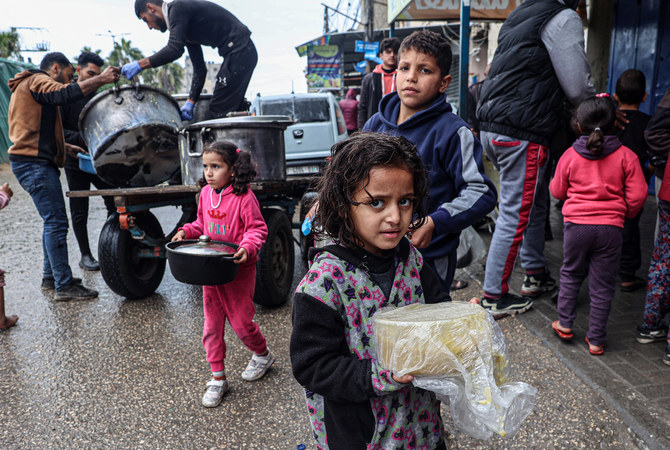
- A UN-backed report published in March said famine was imminent and likely to occur by May in northern Gaza
GENEVA: The Gaza Strip could surpass famine thresholds of food insecurity, malnutrition and mortality in six weeks, an official from the World Food Programme said on Wednesday.
“We are getting closer by the day to a famine situation,” said Gian Caro Cirri, Geneva director of the World Food Programme (WFP).
“There is reasonable evidence that all three famine thresholds — food insecurity, malnutrition and mortality — will be passed in the next six weeks.”
A UN-backed report published in March said that famine was imminent and likely to occur by May in northern Gaza and could spread across the enclave by July. On Tuesday, a US official said the risk of famine in Gaza, especially in the north, was very high.
Cirri was speaking at the launch of a report by the Global Network Against Food Crises, an alliance of humanitarian and development actors including United Nations agencies, the World Bank, the European Union and the United States.
In its report, the network described the 2024 outlook for the Middle East and Africa as extremely concerning due to the Gaza war and restricted humanitarian access, as well as the risk of the conflict spreading elsewhere in the region.
“As for Gaza, the conflict makes it difficult and sometimes impossible to reach affected people,” Cirri said.
“We need to scale up massively our assistance... But under the current conditions, I’m afraid the situation will further deteriorate.”
The United Nations has long complained of obstacles to getting aid in and distributing it throughout Gaza in the six months since Israel began an aerial and ground offensive against Gaza’s ruling Islamist militant group Hamas.
Israel has denied hindering supplies of humanitarian aid and blames aid agencies for inefficiencies in distribution.
Israel’s military campaign has reduced much of the territory of 2.3 million people to a wasteland with a humanitarian disaster unfolding since Oct. 7, when Hamas ignited war by storming into southern Israel.
Cirri said that the only way to steer clear of famine in Gaza was to ensure immediate and daily deliveries of food supplies.
“They’ve been selling off their belongings to buy food. They are most of the time destitute,” he said.
“And clearly some of them are dying of hunger.”
Jordan King, Kuwait Emir stress on importance of reducing regional tensions, avoid escalation
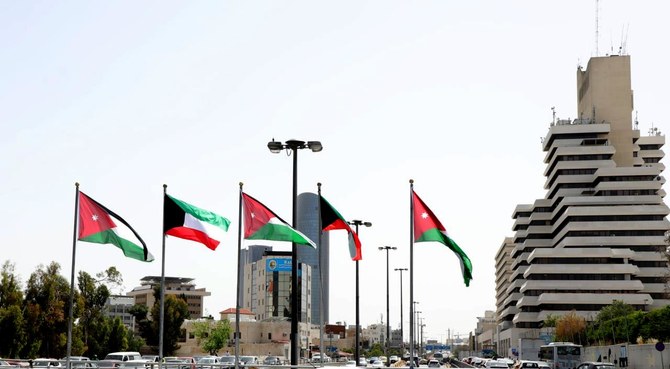
DUBAI: King of Jordan Abdullah II and Emir of Kuwait Sheikh Mishal Al-Ahmad Al-Jaber Al-Sabah stressed on the importance of reducing tensions in the Middle East and avoiding military escalation, according to Petra News Agency.
A joint Jordanian-Kuwaiti statement was issued on Wednesday after the Emir’s two day state visit to the Kingdom.
Both leaders discussed ways to enhance a joint Arab action aimed at confronting emerging regional challenges as well as serving common Arab issues.
The leaders affirmed their support for any steps that ensure the security and stability of the region and stressed the importance of giving priority to dialogue and diplomatic solutions in resolving differences and conflicts.
Their Majesties and Highnesses discussed reaching a just solution to the Palestinian issue and implementing the two-state solution.
The discussions also included talks on investment and tourism, as well as ways to increase trade between Jordan and Kuwait.
Iran cuts Syria presence after strikes blamed on Israel: monitor
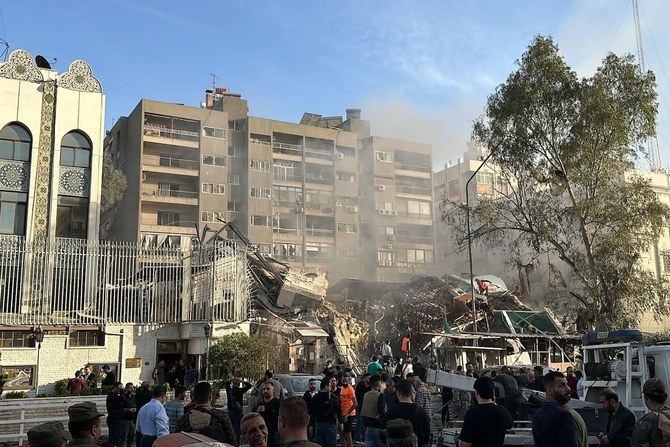
- Iran withdrew its forces from southern Syria, including both Quneitra and Daraa provinces
- Iran has said repeatedly that it has no combat troops in Syria, only officers to provide military advice and training
BEIRUT: Iran has reduced its military footprint in Syria after a succession of strikes blamed on Israel, a source close to Iran-backed militant group Hezbollah and a war monitor said Wednesday.
Iran has provided military support to Syrian government forces through more than a decade of civil war but a series of strikes targeting its commanders in recent months has prompted a reshaping of its presence, the sources said.
“Iran withdrew its forces from southern Syria,” including both Quneitra and Daraa provinces, which abut the Israeli-annexed Golan Heights, the source close to Hezbollah said.
But it still maintains a presence in other parts of the country, the source added.
Recent months have seen a series of strikes on Iranian targets in Syria, widely blamed on Israel, culminating in an April 1 strike that levelled the Iranian consulate in Damascus and killed seven Revolutionary Guards, two of them generals.
That strike prompted Iran to launch a first-ever direct missile and drone attack against Israel on April 13-14 that sent regional tensions spiralling.
But Iran had already begun drawing down its forces after a January 20 strike that killed five Revolutionary Guards in Damascus, including their Syria intelligence chief and his deputy, the source close to Hezbollah said.
Britain-based war monitor, the Syrian Observatory for Human Rights, said Iranian forces had withdrawn from Damascus and southern Syria.
Iran-backed Lebanese and Iraqi fighters had taken their place, Observatory chief Rami Abdel Rahman said.
Iran has said repeatedly that it has no combat troops in Syria, only officers to provide military advice and training.
But the Observatory says as many as 3,000 Iranian military personnel are present in Syria, supported by tens of thousands of Iran-trained fighters from countries including Lebanon, Iraq and Afghanistan.
Abdel Rahman said that many of Iran’s advisers had left Syria over the past six months, although some remained in Aleppo province in the north and in Deir Ezzor province in the east.
Jordan King issues decree to hold parliamentary elections - state TV
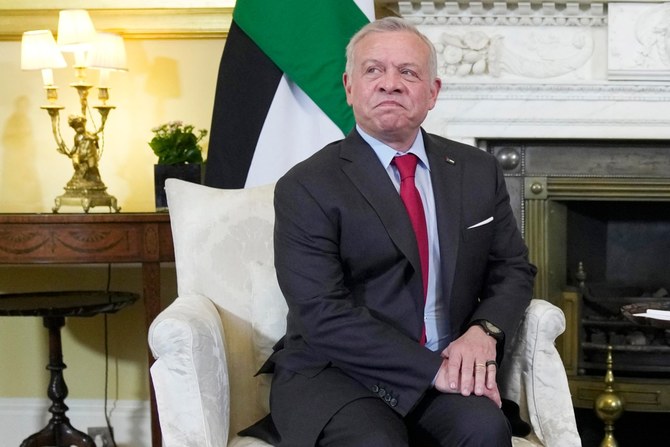
DUBAI: Jordan’s King Abdullah issued a royal decree on Wednesday announcing that a parliamentary election will be held, state TV said.
The election is set to take place on September 10, the Independent Election Commission said, as cited by Jordan’s News Agency (PETRA).
Under the constitution, the multi-party election is usually held within four months of the end of a four-year term of parliament. The country’s last election, with over 4.6 million eligible voters, was held in November 2020.



